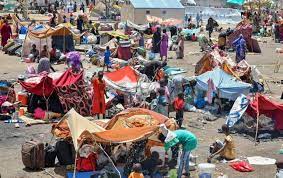

Hundreds of thousands of vulnerable people fleeing the Sudan conflict are in need of humanitarian assistance at South Sudan’s borders, the acting UN humanitarian coordinator in the country said Monday. Marie-Helene Verney, said since the outbreak of the conflict in Sudan on 15 April, thousands of people fleeing the fighting are arriving in South Sudan daily. Nobody had imagined that six months on, we would still be witnessing such large daily inflows,” she remarked.
Since the start of the conflict, South Sudan has received more than 310,000 new arrivals from Sudan as of 13 October, including South Sudanese returnees, refugees and third-country nationals, according to the UN.
Many new arrivals, it noted, are extremely vulnerable and require immediate assistance.
“As the weeks go by, people arrive with less and less resources and in increasingly worse states of health, with malnutrition also on the rise among new arrivals as conditions in Sudan deteriorate further,” stressed Verney.
Concerns have also been raised on the poor infrastructure and in particular lack of roads, flooding and funding constraints have affected delivery of relief aid.
South Sudan continues to face overlapping crises, including floods, conflict and food insecurity, all of which adversely affect the resilience and vulnerability of people across the country. Also, the ongoing Sudan crisis has reportedly had a dramatic negative impact on the already fragile humanitarian situation.
Further highlighted are the disruptions in cross-border trade and humanitarian corridors have led to increased prices of food and commodities, particularly in the northern half of the country where most of the new arrivals are settling.
This, according to IOM, has worsened food insecurity and compounded acute humanitarian needs for the existing population, as well as the new arrivals.
“This crisis has stretched the humanitarian response in South Sudan close to breaking point. With no end in sight, a global decrease in humanitarian funding and more new conflicts breaking out around the world, humanitarian partners are increasingly forced to deprioritize even life-saving activities. In such a context, the Government of South Sudan is called upon to step up the delivery of basic services in vulnerable communities, with the support of development actors,” stressed the acting humanitarian coordinator.
An estimated 9.4 million people or 76% of South Sudan’s population, are projected to need humanitarian and protection assistance in 2023, aid agencies said while the country’s Humanitarian Response Plan (HRP) requires $1.7 billion to reach 6.8 million of the most vulnerable people with urgent vital support.
more recommended stories
 Somaliland Parliament: Any Consequences from PM’s Visit Are Somalia’s Responsibility
Somaliland Parliament: Any Consequences from PM’s Visit Are Somalia’s ResponsibilityHARGEISA, April 12, 2025 — The.
 From Berbera to Washington: Somaliland’s Strategic Pitch for U.S. Support
From Berbera to Washington: Somaliland’s Strategic Pitch for U.S. SupportIn a comprehensive interview with The.
 Somaliland to Defend Sovereignty Against Somalia’s Provocative Laascaanood Visit
Somaliland to Defend Sovereignty Against Somalia’s Provocative Laascaanood VisitThe Ministry of Foreign Affairs and.
 New Director Appointed: Burao Hospital’s Fall and the Fight for Revival
New Director Appointed: Burao Hospital’s Fall and the Fight for RevivalBurao Hospital begins a new chapter.

